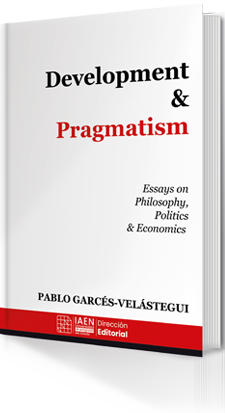Development and Pragmatism

Development and Pragmatism
Autor: Pablo Garcés-Velástegui
2024
256p.; 15 x 21 cm
Electrónico: 978-9942-29-100-4
Prólogo
Development concerns us all. By placing people and their quality of life at the centre of attention, rather than monetary indicators, Amartya Sen’s Capability Approach (CA) has become the most influential alternative account. It has inspired the Human Development paradigm, adopted by the United Nations. The CA provides a richer account of human beings than the dominant neoclassical framework and redefines development as freedom. Nonetheless, that description could be richer still.
Pragmatism is a philosophy of action and change that can add to the CA. John Dewey’s pragmatism focuses on advancing human action and puts philosophy at the service of society. It regards people as embedded in a situation and explains their conduct as part of a continuity. From impulse to reflection, and accounting for contexts, it elucidates all behavior, and, when combined with the CA, it further humanizes development in research and practice.
This book is a compendium of essays at the intersection of philosophy, politics, and economics and offers readers fresh and creative ideas to participate in the constructive interdisciplinary dialogue that the CA has sparked.
Contenido
Table of Contents
Acknowledgements
Abstract
Preface
Introduction
Part I
The Capability Approach and Capabilitarian Agency
Chapter 1
Humanizing Development: the capability approach
1. Introduction
2. Economistic development
3. Against utilitarianism and resourcism
4. Human development
5. The CA in practice: scope and limitations
6. Conclusions
Chapter 2
The Reasoning Agent: agency in the capability approach and some implications for development research and practice
1. Introduction
2. The rational choice approach and agency
3. The CA and Rationality
4. The CA and Freedom
5. Capabilitarian agency and the philosophy of science
6. Conclusions
Part II
Pragmatism and Pragmatic Agency
Chapter 3
Form Follows Function in Evidence-based Public Policy: the pragmatic alternative to the positivist orthodoxy
1. Introduction
2. Positivism
3. Positivist Public Policy
4. Pragmatism
5. Pragmatic Public Policy
6. Conclusions
Chapter 4
From Action to Transaction: some implications of pragmatism and its concept of agency for development research and practice
1. Introduction
2. Philosophical ontology
3. Pragmatism as analyticist
4. Pragmatism, social science, and development
5. Conclusions
Part III
Towards a Pragmatic Capability Approach
Chapter 5
Towards a Pragmatic Capability Approach I: agency, ontology, and empirical issues
1. Introduction
2. Agency
3. Ontology
4. Empirical issues
5. Conclusion
Chapter 6
Capítulo 6: Towards a Pragmatic Capability Approach II: freedom, democracy, and normativity
1. Introduction
2. Freedom
3. Democracy
4. Normativity
5. Conclusions
Conclusion
Agency and Development
References